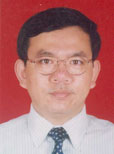-
Educational Background
1999, University of Tokyo Nuclear Reactor Engineering, Doctor
1988, China Institute of Atomic Energy Nuclear Reactor Safety, Master
1983, Shanghai Jiao Tong University Nuclear Reactor Engineering, Bachelor
-
Professional Experience
1983 Southwest Institute of Nuclear Physics and Chemistry
1988 Engineer/Associate Researcher, China Institute of Atomic Energy
1999 Japan Nuclear Fuel Cycle Development Institute
2002 Professor, School of Mechanical Engineering, Shanghai Jiao Tong University
-
Research Interests
Nuclear Reactor Engineering
Nuclear Safety
Severe Accident
PSA
Nuclear Reactor Thermal-hydraulics
Use of Nuclear Energy
CFD
Multi-phase Flow and Heat Transfer
-
Research Projects
2015-2019,National Science and Technology Major Project,Study on Hydrogen Safety in Containment.
2014-2017,China Ministry of Science and Technology, Thermohydraulic Design and Safety Analysis of Water Cooled Blanket.
2009-2013,China Ministry of Science and Technology, Interaction Mechanism on nuclear reactor coolant pump and correlation systems.
2010-2012,Doctoral Fund of Ministry of Education of China,Research on heat transfer with intermittent buoyancy induced flow.
2010-2013,Chinese National Fusion Project for ITER, Plasma radiation experiment and Non-destructive testing on Plasma Facing Materials and components
2006-2008,National Natural Science Foundation of China, Research on Thermal Fragmentation of Molten Material with Coolant Interaction.
2007-2008,NSFC-RFBR Joint Program, Research on thermal fragmentaton in liquid medium.
-
Selected Publications
1.D Wand, L Tong *, X Cao. Numerical study on the influence of steam condensation on hydrogen distribution in local compartments. Annals of Nuclear Energy. 121 (2018) 468-478.
2. L Tong*, X Zhou, X Cao. Ultimate pressure bearing capacity analysis for the prestressed concrete containment. Annals of Nuclear Energy. 121 (2018) 582-593.
3. C.P, L.L.Tong, X.W.Cao. A hydrodynamic fragmentation model based on boundary layer stripping. Annals of Nuclear Energy 80 (2015) 95-100.
4. Y.Li, X.W. Cao*. Strategy evaluation for fire spray system on Advanced Passive PWR Severe Accident Management Guideline. Progress in Nuclear Energy 85 (2015) 319-324.
5. J.B.Chen, X.W. Cao*. Experimental investigation of effective parameters on geyser periodicity in a vertical heated system. Experimental Thermal and Fluid Science 68(2015) 163–176.
6. J.B.Chen, X.W. Cao*. Study on intermittent flow behavior in a vertical channel under low-pressure condition. Journal of Nuclear Science and Technology 52(1) (2015) 131–142.
7. G.F.Huang, L.L.Tong, X.W.Cao*. Study on Mitigation of Ex-vessel Release of Fission Products in Severe Accidents of PWR. Progress in Nuclear Energy 2015, 78: 56-64.
8. Y.B.Li, L.L.Tong, X.W.Cao*. In-vessel retention coolability evaluation for Chinese improved 1000 MWe PWR. Annals of Nuclear Energy. 2015, 76: 343–349.
9. X.M.You, L.L.Tong, X.W.Cao. Preliminary experimental study of liquid lithium water interaction. Fusion Engineering and Design, doi:10.1016/j.fusengdes.2015.02.057.
10. X.M.You, X.W. Cao*. Study of liquid lithium coolant interaction based on BP neural network optimized by genetic algorithm. Journal of Fusion Energy 34 (3)(2015) 671-678.
11. L.L.Tong, G.F. Huang, X.W.Cao∗. Simulation of fission products behavior in severe accidents for advanced passive PWR. Annals of Nuclear Energy 2015,76 : 493–503
12. Deng J., Cao X.W. A study on implementing a passive autocatalytic recombiner PAR-system in the large-dry containment,Nuclear Engineering and Design 2008,238(7):2554–2560.
13.Huang Gaofeng,Li Jingxi,Tong Lili,Cao Xuewu,Analysis of Effect of the Intentional Depressurization on Fission Product Behavior during TMLB’ Severe Accident,Nuclear Science and Techniques,2009,20(6) 373-379.
14.TAO Jun CAO Xuewu, Effect of water injection on hydrogen generation during severe accident in PWR,Nuclear Science and Techniques, Vol.20, No.5 2009 312-316.
15.DENG Jian, CAO Xuewu, analysis of hog leg natural circulation under station blackout severe accident ,Nuclear Science and Techniques,2007,18,(2) :123–128.
-
Teaching
1. Nuclear Reactor Engineering, undergraduate, 45Hrs, 3 Credits
2. Advanced Nuclear Reactors and Applications, undergraduate, 36Hrs, 2 Credits
3. Nuclear Fuel Cycle, graduate, 54Hrs, 3 Credits



